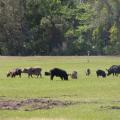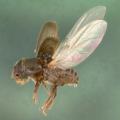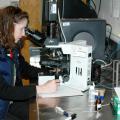News From 2010
By Patti Drapala
MSU Ag Communications
MISSISSIPPI STATE – A group of Mississippi State University students has spent two years breathing life into the inactive chapter of Collegiate 4-H on campus, and for those doing the hard work, recognition from the National Collegiate 4-H organization feels great.
By Karen Templeton
MSU Ag Communications
MISSISSIPPI STATE – Wild pigs are digging up trouble across the state and causing major crop damage, so Mississippi State University and federal experts are helping landowners and farmers eradicate the troublesome beasts.
Wild pigs are a highly adaptable species that is not native to North America. They are seen throughout the country, causing vast agricultural and environmental damage.
MISSISSIPPI STATE -- Intercollegiate rodeo competition will return to Mississippi State University on April 9 and 10 when students host the first events on campus in several years.
MISSISSIPPI STATE – Each year, replacing deteriorated wood in U.S. homes costs billions of dollars, but research at Mississippi State University is helping protect homeowners’ wallets and the environment.
“Since 1988, scientists in the Forest and Wildlife Research Center have been studying the development of totally organic biocides,” said Tor Schultz, MSU forest products professor.
MISSISSIPPI STATE – Many Mississippians don’t mind unusually cold and wet winters because they think the weather is killing insects, but that is rarely what actually happens.
The state’s moderate climate is ideal for growing crops and multiplying insects, and the insects that live in Mississippi are suited to weather fluctuations. An insect’s ability to survive the winter is called overwintering, and it determines how quickly their numbers increase in the spring.
Spring is one of my favorite times in the garden as the transition begins from a long, cold winter to gardens full of flowers in summertime.
Mississippi has many plant species that bloom very early in the year when the temperatures are still fairly cool. Tulips, daffodils, crocus and hyacinth color the garden when there are few other flowers. However, the downside to these wonderful spring-flowering plants is the foliage begins to look ratty after the flowers are spent.
MISSISSIPPI STATE – Two Mississippi State University College of Veterinary Medicine graduate students were awarded top honors at the recent MidSouth Computational Biology and Bioinformatics Society Conference.
MISSISSIPPI STATE – Students at Mississippi State University’s College of Veterinary Medicine will welcome thousands of school children to campus on the second weekend in April.
MSU’s College of Veterinary Medicine will open its doors from 8:30 a.m. until 3:30 p.m. on April 9 and from 8 a.m. until 2 p.m. on April 10 for the 26th annual open house. “Treat Them All, Big and Small” is the theme for this year’s event at the Wise Center, located on the south side of campus off Spring Street.
VERONA – Almost 300 producers of agricultural products ranging from goats to sweet potatoes met at the North Mississippi Research and Extension Center in Verona Feb. 18 to discuss services they need from Mississippi State University.
Each year since 1953, North Mississippi agricultural producers have come together to discuss their research and educational needs. They then report those needs to Extension Service and Mississippi Agricultural and Forestry Experiment Station administrators.
By Amy Taylor and Karen Templeton
MSU Ag Communications
MISSISSIPPI STATE – Farm women with a passion to succeed are increasing their business knowledge and skills through the Mississippi Women in Agriculture program.
Do you ever wonder how some people manage to have such beautiful plants in their gardens? You may think they shop somewhere special you’ve never heard about and know deep gardening secrets, but you, too, can create an inspiring landscape and grow beautiful and healthy plants.
It all begins with selecting healthy specimens at the local nursery or garden center. Look for plants that have strong branches with no crossed limbs and straight and sturdy trunks. The leaves should be of normal size, shape and color for that plant species.
MISSISSIPPI STATE – A new program at Mississippi State University is looking at new ways to stop a pest that kills an estimated 12 million cubic feet of the state's pine forest annually.
Research efforts usually focus on early-detection methods and control mechanisms for the southern pine beetle. But MSU experts believe preventive measures will better control this destructive pest.
MISSISSIPPI STATE – Child-care directors may feel alone as they try to manage teachers, families and children, but help is just a phone call away with a toll-free number provided by Mississippi State University.
The Mississippi Child Care Resource & Referral Network supports the unique needs of child-care center directors through a statewide network that offers free educational items and professional development courses through MSU’s Extension Service. The MSCCR&R Network provides a wide variety of services for child-care providers, parents and children.
RALEIGH -- Poultry and cattle farmers will gain the latest production recommendations from state and national experts during educational seminars and a trade show set for April 8 in South Mississippi.
The Magnolia Beef and Poultry Expo will take place at the Smith County Agricultural Complex on Highway 35 South in Raleigh.
If limited time or garden space challenges you to decide between an ornamental landscape and a vegetable or fruit garden, you may want to look at both of these areas from a new perspective.
The concept of incorporating edible plants into an ornamental garden is not new. Many of us are already doing it. Adding a pot of rosemary or parsley to your patio certainly qualifies. Most perennial or annual herbs or vegetables are great for containers or borders and can be beautiful as well as tasty.
By Patti Drapala
MSU Ag Communications
WEST POINT – More than 60 years have passed since Clay County 4-H agent Elizabeth Miller chose young Norman Armstrong to lead Rally Day, and his participation in the organization that helps young people develop their potential is not yet over.
MISSISSIPPI STATE – Seven states with the country’s highest obesity rates are in the South, but this issue that causes health problems such as diabetes and heart conditions cannot be blamed simply on Southern roots.
A study by the Southern Rural Development Center headquartered at Mississippi State University found that simply living in a region does not lead to obesity. In “The South Does Not Make You Fat: A study of nutrition, food security and obesity,” researchers found that minorities and lower-income groups have higher obesity rates.
I don’t want to alarm anyone too badly, but there are multiple volcanoes forming in our Mississippi communities as you read this column.
When you hear the word “volcano,” you might think of active volcanoes in Hawaii or other places around the globe. Some might envision the big volcanoes in the solar system, such as the one on Mars that is as big as Arizona. Still others remember bad Hollywood movies like Volcano, about a volcano forming under Los Angeles.
MISSISSIPPI STATE -- Parents should rely on dietitians’ and medical experts’ recommendations before attempting to alter formula that they prepare for their infant.
Brent Fountain, nutrition specialist with the Mississippi State University Extension Service, said newborn babies may need time for their bodies to adjust to nutrients consumed outside the womb. Most babies enter the world with natural abilities to know when they are hungry and to stop eating when they are full.
By Rebekah Ray
Delta Research and Extension Center
STONEVILLE -- Mississippi produces more than 60 percent of the nation’s pond-raised catfish, and Mississippi State University researchers in the Delta are working to keep the fish flavorful and safe to eat.
MSU’s College of Veterinary Medicine oversees the Aquatic Research and Diagnostic Laboratory at the Thad Cochran National Warmwater Aquaculture Center. The center is located at MSU’s Delta Research and Extension Center in Stoneville.
Pages
News Types
- Crop Report (413)
- Feature Story (5827)
- Feature Photo (53)
- Extension Outdoors (318)
- Southern Gardening (1427)
- Extension Inbox (95)
Archive
- 2024 (101)
- 2023 (182)
- 2022 (187)
- 2021 (177)
- 2020 (212)
- 2019 (223)
- 2018 (276)
- 2017 (338)
- 2016 (383)
- 2015 (457)
- 2014 (498)
- 2013 (490)
- 2012 (492)
- 2011 (356)
- 2010 (323)
- 2009 (313)
- 2008 (273)
- 2007 (263)
- 2006 (252)
- 2005 (278)
- 2004 (273)
- 2003 (279)
- 2002 (228)
- 2001 (238)
- 2000 (243)
- 1999 (233)
- 1998 (232)
- 1997 (239)
- 1996 (58)
- 1995 (36)











